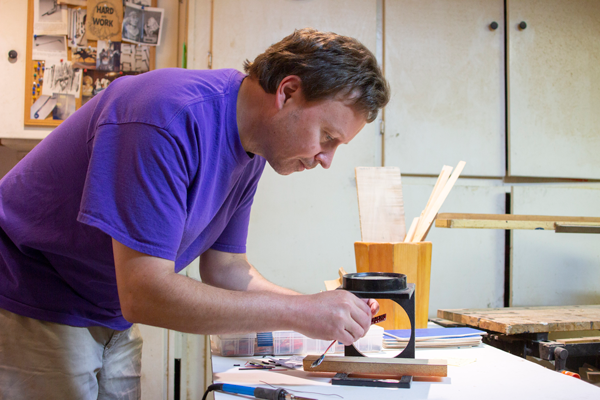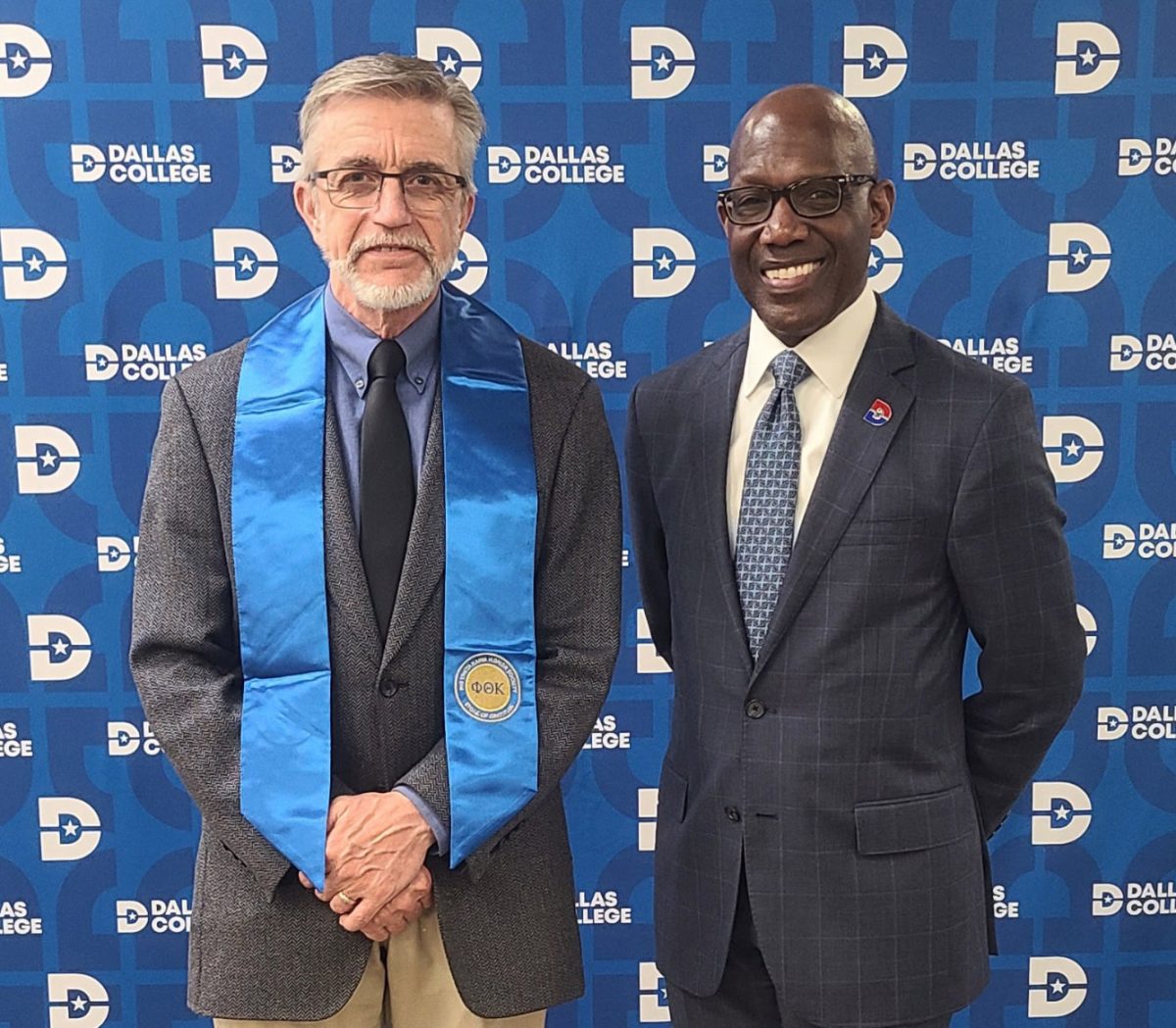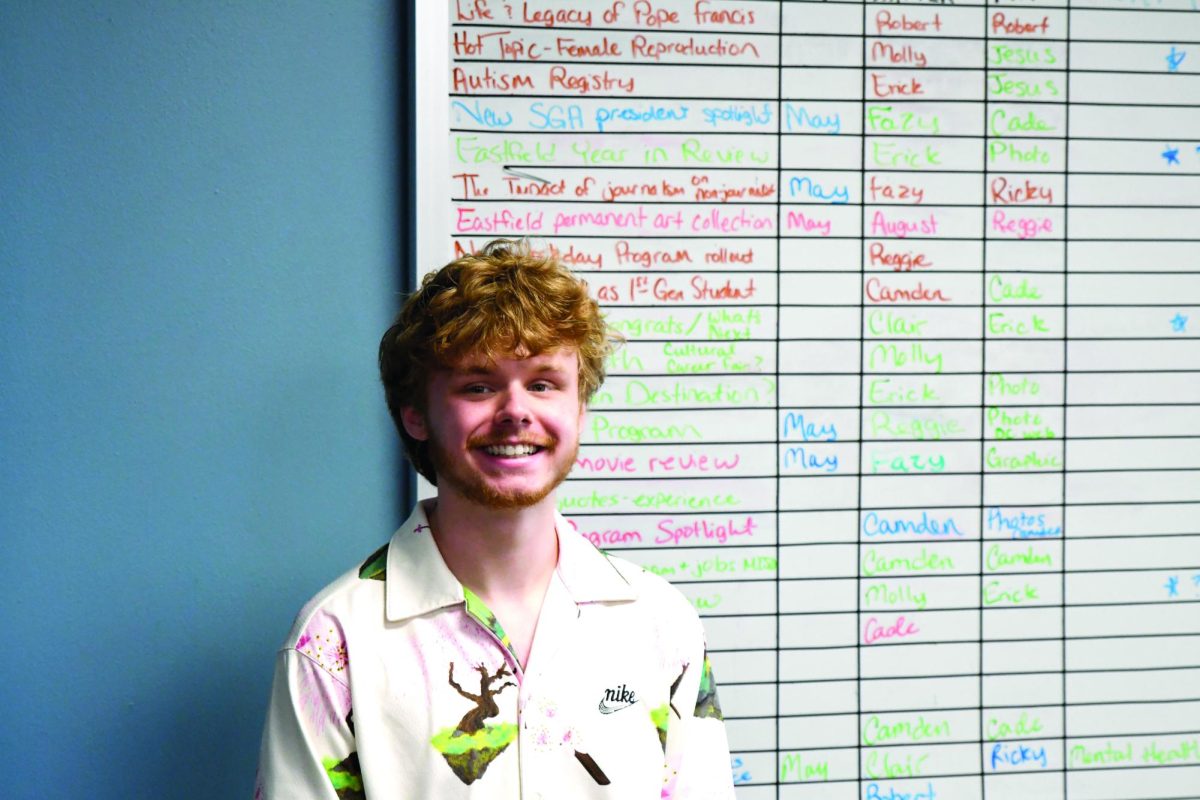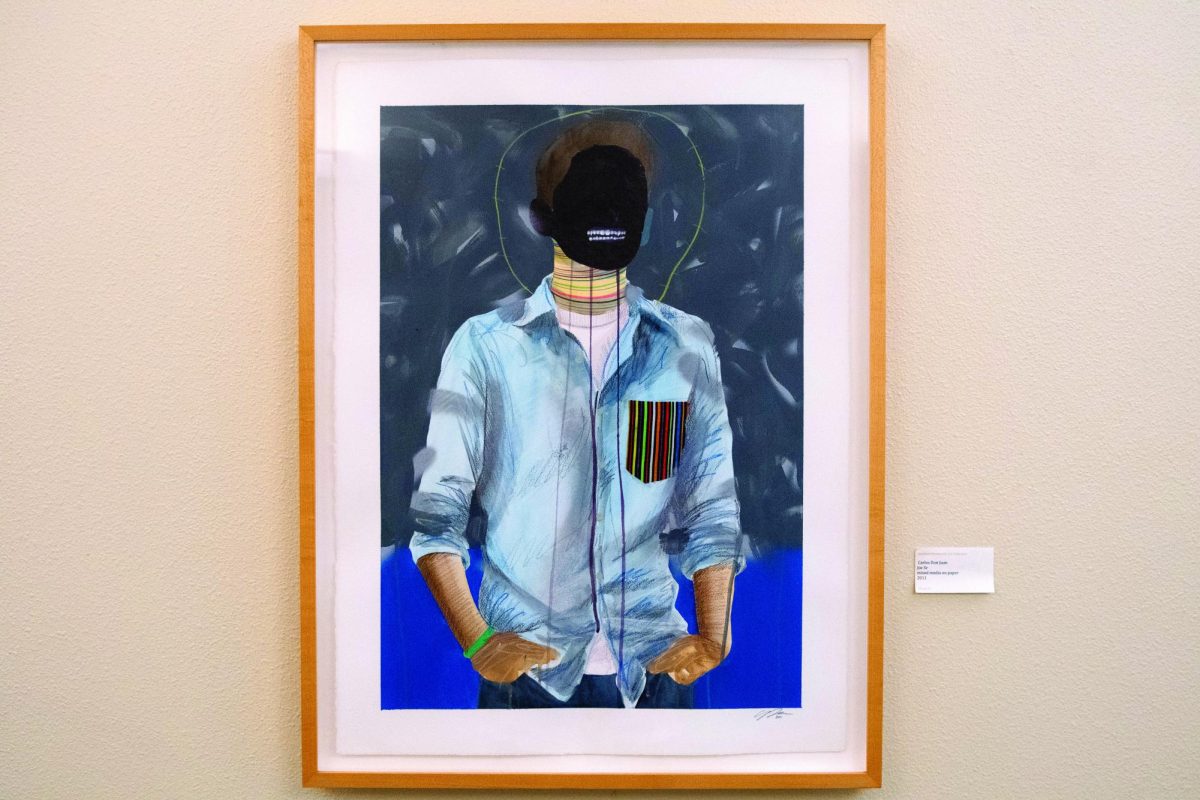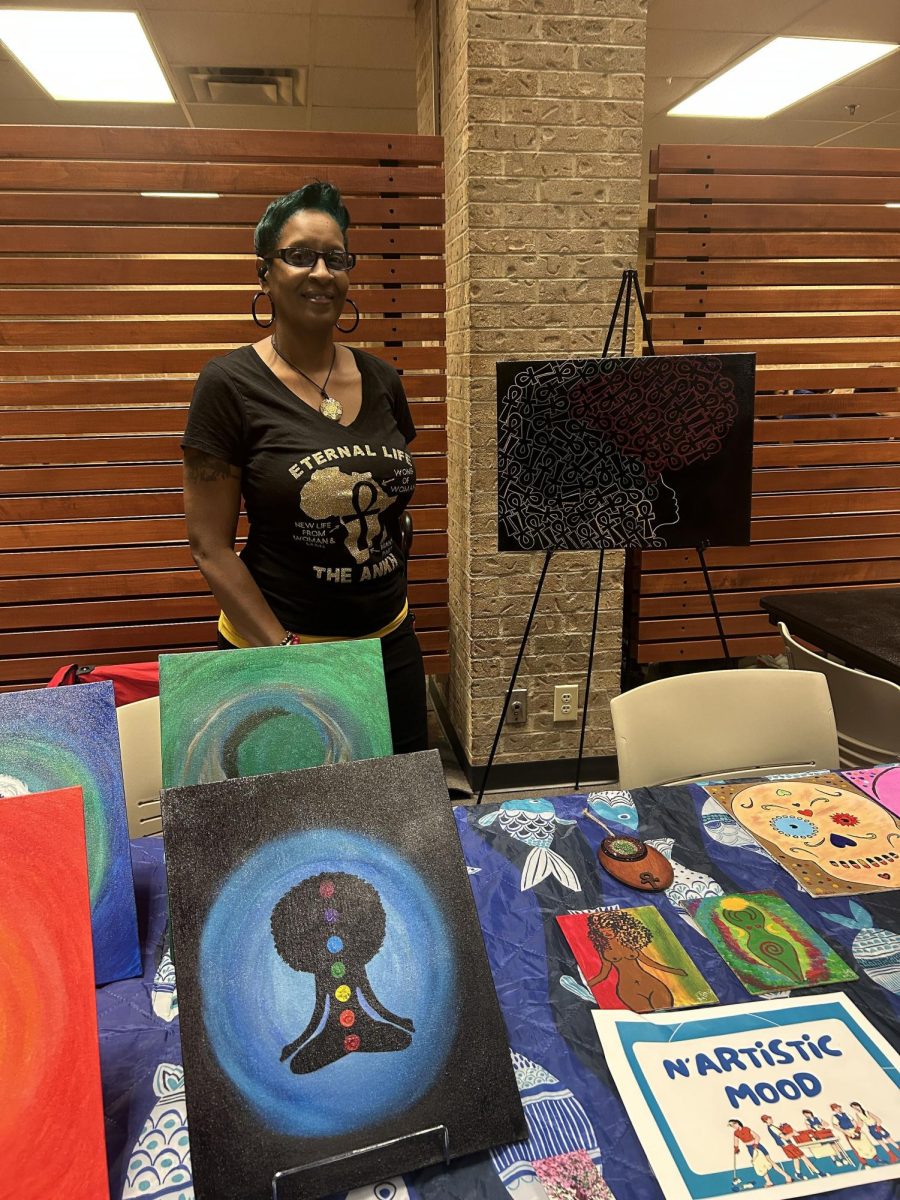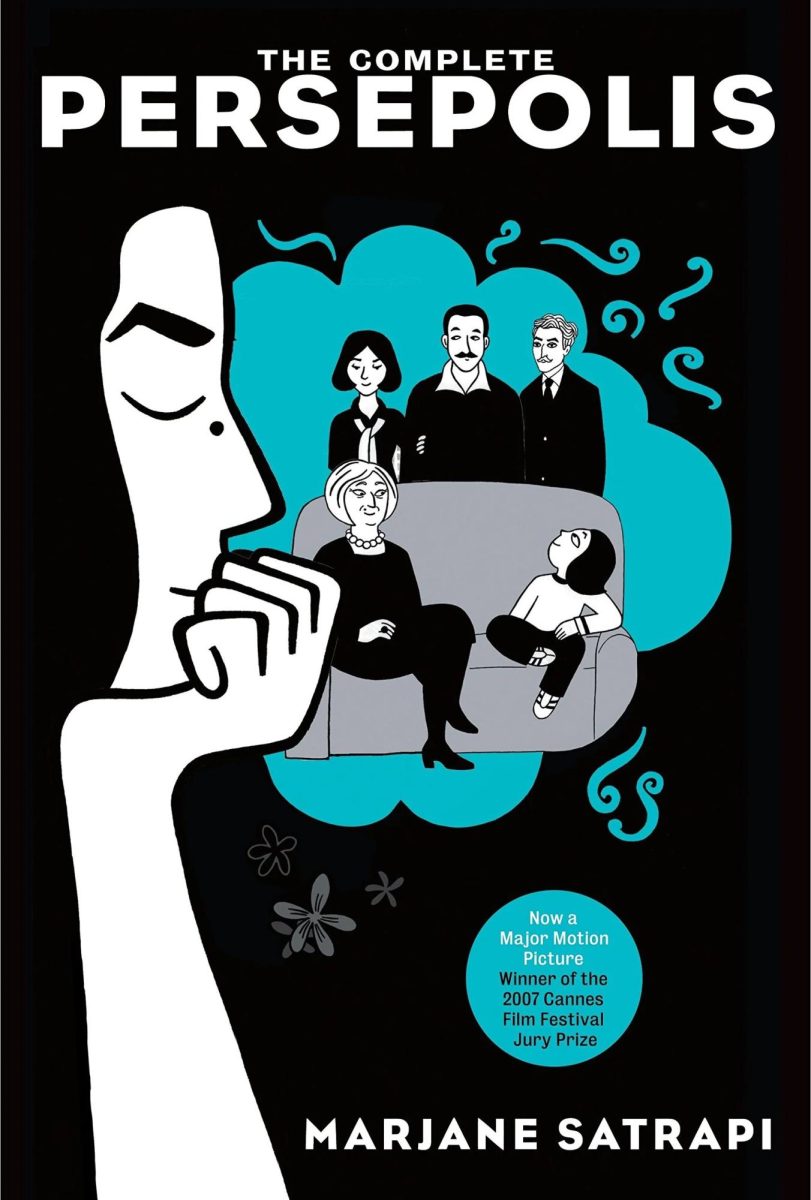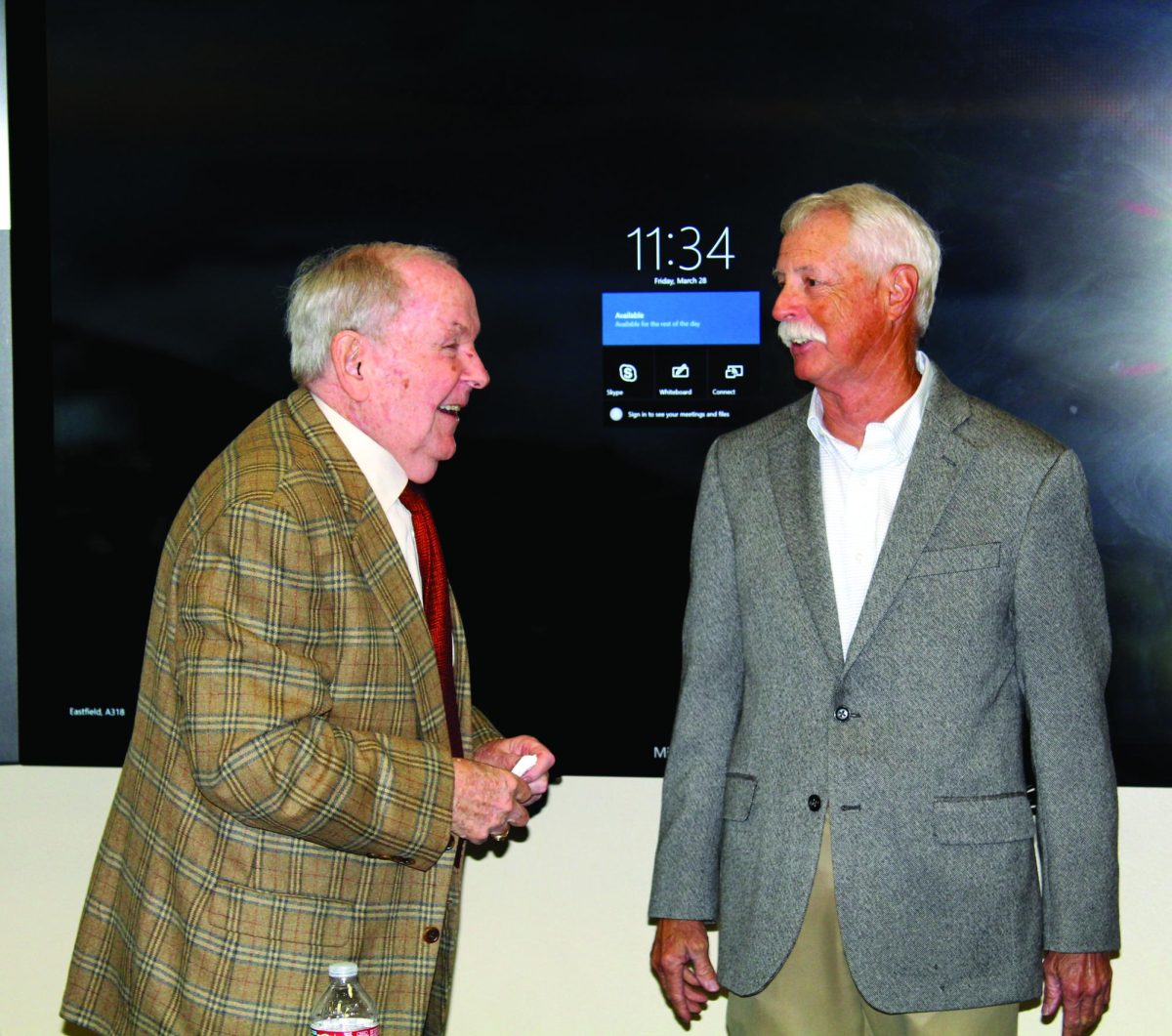By ANDREW WALTER
@AndyWalterETC
Computer programming professor David Kirk tells his students that they will receive 20 bonus points on their final project if they present it to the entire class. Computer science major David Townsend sits at his desk awaiting his chance to present his Star Wars-themed map game.
As the more timid students hurriedly clacked away on their keyboards, scrambling to finish their projects on the last day of the eight-week class, Kirk emphasizes the importance of developing soft skills to his class of mostly computer science majors.
While some students simply followed a basic medieval castle or mansion design for the project, Townsend was one of a handful who let their nerdy creativity shine. His project was a model of Echo Base from “Star Wars Episode V: The Empire Strikes Back.”
Before he could present, however, he needed to figure out how he would demonstrate his use of Dijkstra’s Shortest Path First algorithm while presenting. He and the class were used to sitting and coding at their desks on a computer, not standing somewhat awkwardly in front of almost 30 other college students.
Kirk wasn’t worried at all for Townsend. Kirk easily recognized that Townsend knew his way around a computer, and with a little help sharpening his soft skills, Kirk could better prepare him for a dream career at Google, Samsung or just about any other big-name tech company.
“You’ll be impressed,” Townsend said. “All of my tabbing is perfectly done. All my indentions …”
“Oh, well that’s the important thing,” Kirk said as he and the rest of the class laughed.
Kirk laughed because he remembered when he was younger and just as shy as many of the students in the room. It took several years and some chance happenings for Kirk to become more relaxed around people, which is helpful if you want to be a professor.
“When I was your age, I didn’t talk to anyone,” Kirk said to the class.
“You don’t look shy now,” said computer science major MJ Parvini.
“Well this is also my domain,” Kirk said. “If you stuck me in front of 500 people in the big auditorium here …”
“Same. Same,” Parvini said, chuckling nervously.
Kirk has taught computing classes at Eastfield for nearly 20 years. When he isn’t in the classroom lecturing about programming, he loves to spend his time building: building programs on his computers, building furniture and knick-knacks in his dad’s workshop and building relationships with his students.
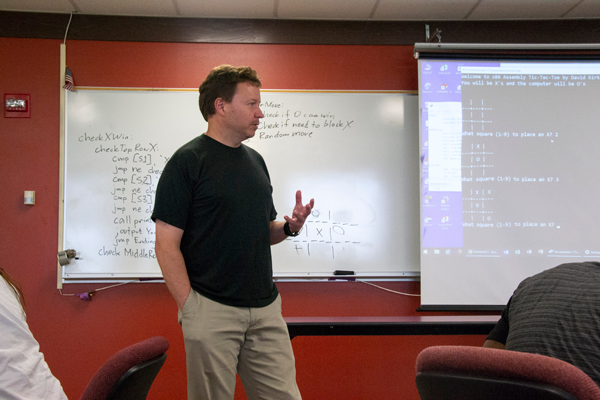
Kirk regularly stands in front of webs made of numbers and code, typically dressed in a bright colored polo tucked into blue jeans held up by a leather belt and rocking casual tennis shoes that would make Steve Jobs proud.
“It’s not about wearing a stupid suit,” he said. “It’s about what you get done at the end of the day.”
Coming out of his shell
It was the tail end of the ‘90s, and Kirk wanted a change of pace from his job of managing a database at PRC Environmental, an Environmental Protection Agency-contracted company that coordinated with manufacturing plants in Mexico. He was about to try teaching a computing class at Richland College.
“Someone called me and asked me if I could teach this class starting in a week, and I’d never taught a class, and I agreed to it,” Kirk said with a chuckle.
On the first, Kirk wondered why he had taken the job. He was used to working in rooms filled with servers and archives, staring at a computer screen on the average workday. Five feet from the classroom door, he paced back and forth, peeking into the narrow window to see all the students slouched over their desks.
“I’m gonna walk into this classroom and 25 people are gonna be looking at me, and that just scared the tar out of me right there,” he said.
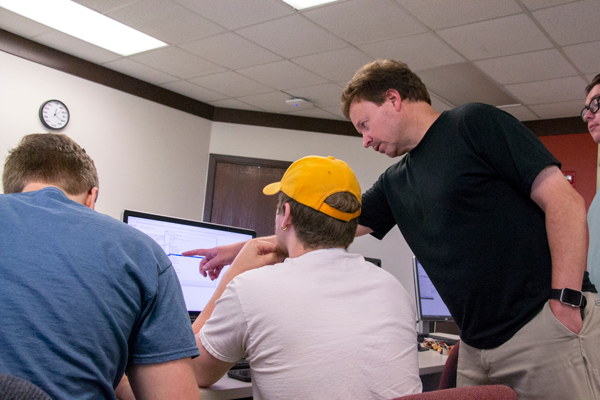
At home the night before, he hadn’t gotten any sleep. He had printed more than 30 copies of a simple crossword puzzle to give to his students if his anxiety or sweaty palms made him feel the need to step outside.
Inside the classroom, he stood in front of the students for a minute looking around as if he didn’t belong there. Then he introduced himself and began his first lecture as a professor. Fifteen minutes into the class, for some inexplicable reason, it clicked.
He never had to dig those crossword puzzles out of his briefcase.
“After the first day, a lifetime of shyness, I got over it,” Kirk said. “Right there. Now I can walk into the first day of class and not even care.”
He’d enjoyed it so much that after teaching part-time at Richland for two more years, he applied and was hired as full-time faculty at Eastfield.
Like father, like son
Growing up, Kirk loved to watch his father, Don, go into their workshop and hand-build kitchen cabinets, tables, desks, string instruments and household decorations such as mantlepieces and paleolithic-style tools. Kirk then added his own personality into the family craft: his love of computers and technology in general.
By the eighth grade, he had bought his first computer with a tiny text keypad and a four-LED text screen. In the 10th grade, he bought a TRS-80 from RadioShack and started learning how to program text-based adventure games.
After his parents moved from Dallas to Sunnyvale and he started working at Eastfield, Kirk would regularly visit his parents’ house on the weekends to check up on them and work in his dad’s 10-by-12 workshop in one section of their three-car garage.
He could be soldering some wiring for his electronics, or handling his dad’s band saw, cutoff saw, sanders and hammers to build a computer table for his home in White Rock. Don said he doesn’t help his son build much because he doesn’t need it. He only gives him the usual father-to-son pointers.
“He has his own ideas,” Don said. “He’s always tinkering with something. People should branch out. He’s an innovator.”
Kirk sees things a bit differently than his father. When he spent more than six hours a day, three days per week for two weeks building a prize wheel for use at Eastfield festivals and fundraisers, his dad was always there with him. They sanded the edges of the wheel to shape it, drilled in the wooden pegs and painted each section together.
“He definitely helps more than he says,” Kirk said. “Impresses the heck out of me.”
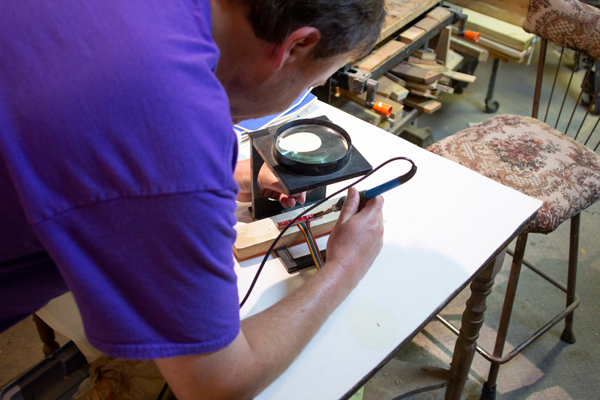
They’ve also built a computer table, desk and bookcase for Kirk’s old apartment. In his old age now, as Don calls it, he mostly likes to watch his son build larger wood projects while he has taken up whittling 8- to 10-inch tall wooden figures of animals, cowboys, Indians and western-style carvings galore to line his handmade shelves.
Humility isn’t the only character trait the father and son share. Before retiring more than 30 years ago, Don worked as a civil engineer for an oil company. He loved surveying, drafting, building furniture and designing the layout of the company offices. Kirk said he inherited his father’s boredom with management and administrative tasks. They like to get stuff done, not sit in meetings.
“I’d rather dig ditches in the hot summer all day long instead of sit in some conference,” he said.
Electric boogaloo
Kirk learned about building furniture from his father. He has taught his dad everything he knows about computers, including how to use Microsoft Word, Excel and Adobe Photoshop.
“I don’t do computers,” Kirk’s 86-year-old father said of his own technical skill.
That knowledge helped Don create a book about the Kirk family’s genealogy.
Kirk figures it’s the least he can do. If it wasn’t for the 50-in-1 electronics kit his dad gave him for Christmas when he was a kid, he isn’t sure he would be so passionate about technology.
“Buy any kids you know an electronics or science kit instead of dolls or action figures,” Kirk advises.
He was just like many other quiet kids. If he wasn’t reading a sci-fi or fantasy book such as “Ender’s Game” or “Lord of the Rings” sitting in his room, he was studying for school.
He even remembers when his dad built a stereo system from a kit in the ‘70s. Upon hearing Peter, Paul and Mary’s “Early in the Morning” on it, tears streamed down Don’s face. He was thankful for the technology that let him hear one of his favorite songs in the comfort of his home that didn’t come from the radio, one of his own handmade instruments or anywhere else.
Kirk used that same stereo system to listen to his dad’s records after school. He said those times relaxing after school and studying computer programming and hardware inspired him to start going into the workshop with his dad.
The geekdom grotto
Much like his youth of studying and gadgets and gizmos, Kirk’s office consists of piles of papers, an Apple II computer sitting between those piles, some of his old woodcrafts and his various robotics projects scattered about. Next to his office computer monitor are some stones the size of a toddler’s fist that Kirk collected from his trips to Mexico City with PRC Environmental.
One of his robotics projects is the BB-8 remote-controlled droid he spent eight months working on before unveiling it at Eastfield’s fall 2016 convocation. Another is a basic computer monitor on wheels he dubbed Kirkatron. He started building it in spring 2013 with one of his former students and finished it that summer in his favorite workroom, his dad’s workshop, with his dad.
He unveiled the Kirkatron at the fall 2013 convocation under a feminine guise: the Cookatron, played by assistant to the president Sharon Cook.
“Everything takes five times as long to build as you think it’s going to,” Kirk said. “But the time you spend building stuff is so rewarding. When you accomplish something, you feel so much better than if you just sit down and watch Netflix all day.”
There are plenty more mementos beside his robotics projects. On an older model iPhone, Kirk had an English to Spanish language learning app called “Lingo Cat.”
Whenever he’s at home not working on a side project or grading assignments, he spends his time with his real cat Khaleesi, who was orphaned by Hurricane Harvey.
Starting in 2014, over the course of three years, and with some assistance from Spanish professor Ana Piffardi, he worked on “Lingo Cat” in his spare time. “Lingo Cat” isn’t currently available on the app store because he hasn’t taken the time to update it to later operating systems of newer iPhones.
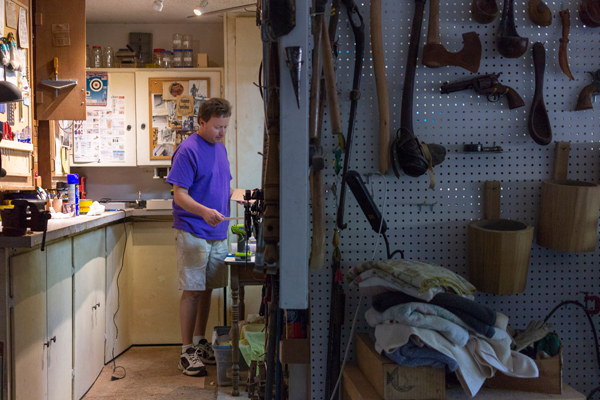
Hanging above the guest chairs in his office is a wood-crafted sign with built-in lights that looks like the Dallas skyline. He made it in his dad’s workshop almost 10 years ago. Back then, Kirk was the adviser for Eastfield’s now defunct Fashion Club. Despite knowing nothing about fashion, he made all the props the club ever needed.
“I have nothing to do with the fashion, but I built stuff for them,” Kirk said. “I did a website for them. I edited their videos of their shows. We put on some big shows.”
Lofty heights
It was fall 2017, and Kirk hadn’t seen his former student Marcellus Pelcher in several years, so he didn’t know what to expect of the now 35-year-old software engineer while waiting for him at the Panera Bread near Town East Mall.
After Pelcher arrives and they greet each other, they pick up their sandwiches from the cashier, sit back at the corner booth table and talk just like they used to more than a decade ago in programming class in L-311.
The technobabble that ensued led the pair to discuss the bitcoin craze and how it was like Tulip mania, the phenomenon from the Dutch Golden Age where the price of a single tulip rose up to the average worker’s yearly salary.
Pelcher told Kirk he had worked for Raytheon and Facebook, and that he was currently developing conversational user interface at Google.
Kirk couldn’t be prouder of his former student. He had kept up with Pelcher over the years and knew that he was a programming hotshot, but he didn’t know that Pelcher’s soft skills developed enough for him to give presentations at conferences for these companies.
Once their time catching up came to an end, Kirk walked over to the touch screen kiosk to pay for both his and Pelcher’s sandwiches and the pair headed for the door.
As they walked out the door, Pelcher told Kirk his yearly salary. Kirk was stunned.
“Man, I should’ve made you pay!”

